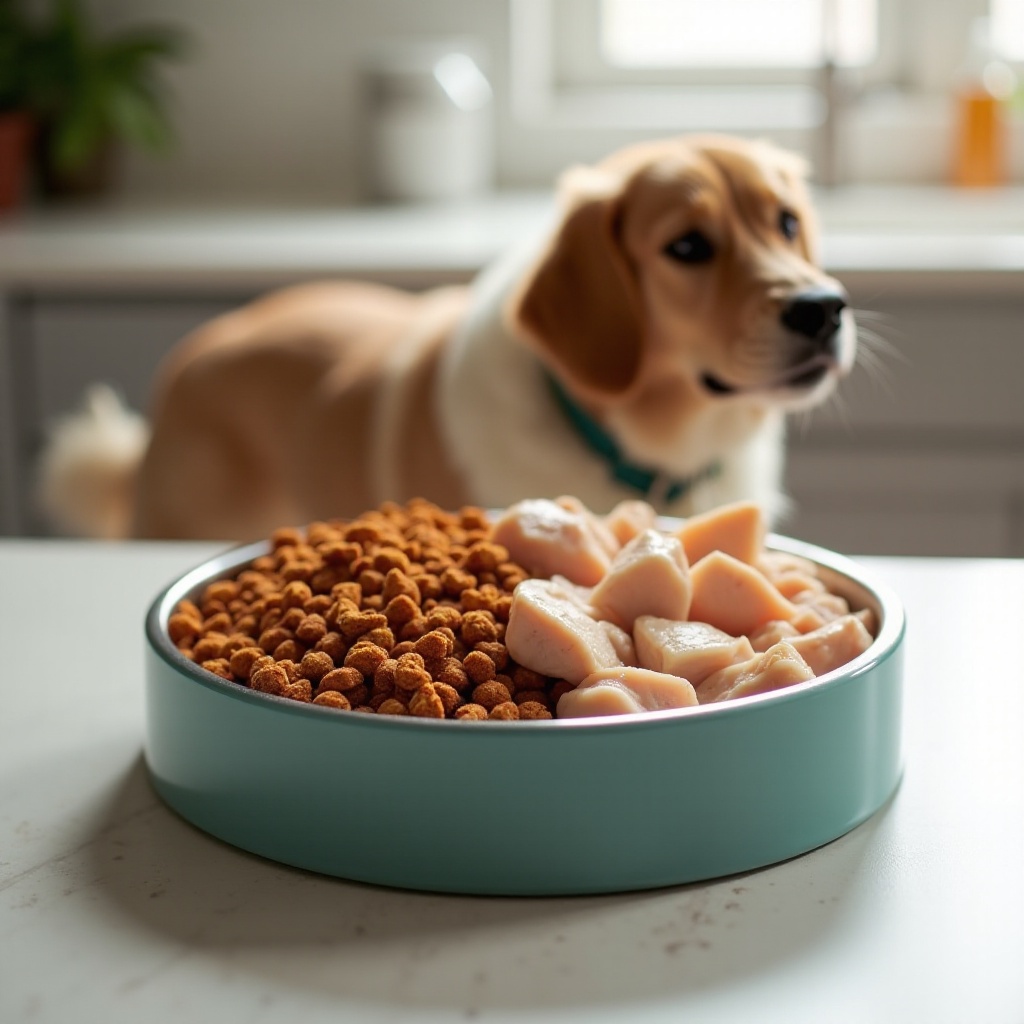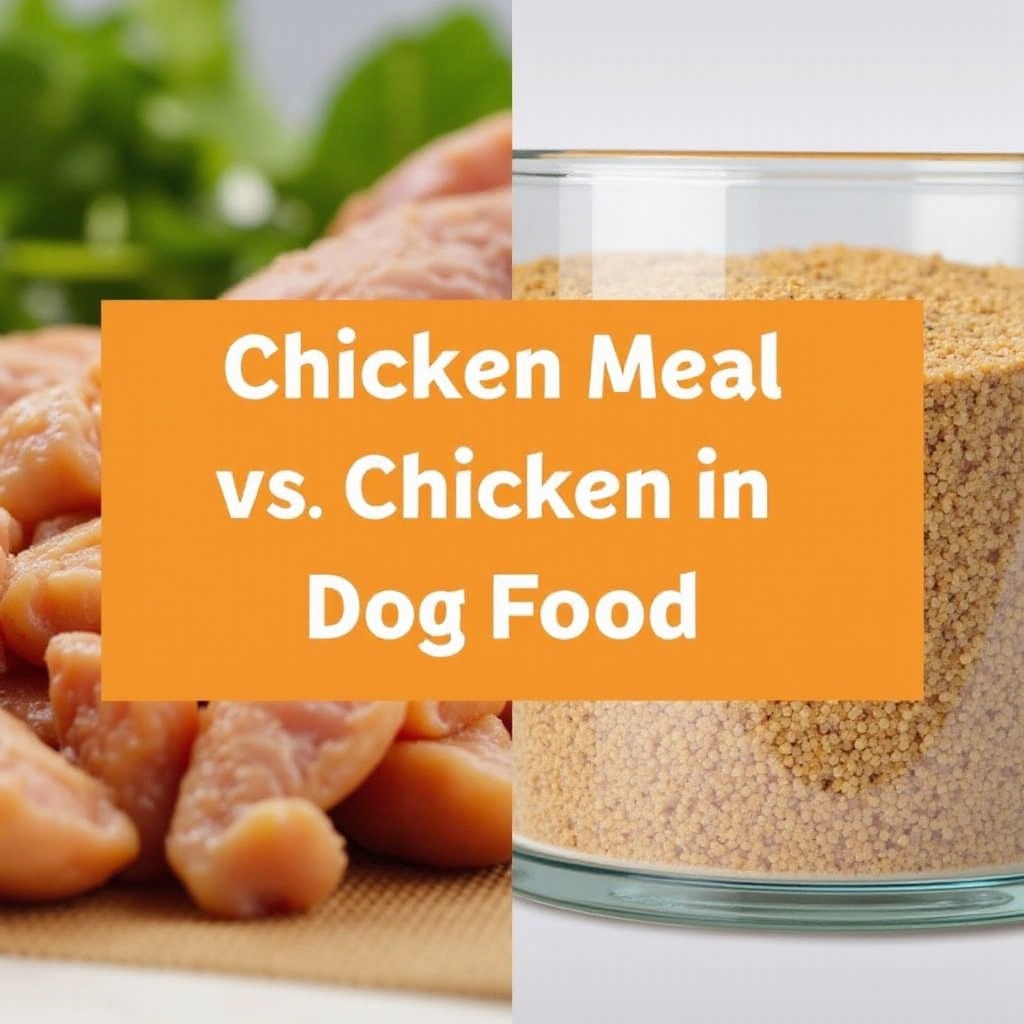Introduction
Choosing the right food for your dog involves understanding the ingredients that go into pet foods. One of the main considerations is whether to opt for chicken meal or fresh chicken. This decision directly impacts your dog’s health, nutrition, and overall well-being. Understanding the differences between these two options will help you make an informed choice.

What is Chicken Meal?
Chicken meal is a high-concentration protein source made from the clean parts of the carcass. In dog food manufacturing, chicken meal undergoes processing to remove the water content. This process involves cooking chicken at high temperatures to produce a concentrated powder. The purpose of creating chicken meal from chicken parts ensures a more stable protein source that can be easily added to various pet food formulations.
Chicken meal typically includes muscle meat, skin, and bone, providing a richer protein content compared to fresh chicken. By removing the water, the resulting meal offers a more concentrated form of protein, essential for canine growth and maintenance. The digestibility and nutrient density of chicken meal make it a popular choice in many premium dog foods.
What Constitutes ‘Chicken’ in Dog Food?
When we talk about ‘chicken’ in dog food, we’re referring to fresh, whole chicken parts. These can include the meat, skin, and sometimes bone. Fresh chicken is considered highly nutritious since it is a lean protein source and is high in essential amino acids and vitamins.
Fresh chicken in dog food usually contains up to 70% moisture, which means the actual protein content is lower when compared to chicken meal. However, fresh chicken is often perceived as more natural and less processed, appealing to dog owners who prefer more whole food ingredients for their pets. Knowing this makes a significant difference in understanding how fresh chicken contributes to dog food formulations.

Comparative Analysis of Chicken Meal and Chicken
To decide between chicken meal and fresh chicken in dog food, it’s necessary to compare these options on several fronts. The key aspects include nutritional content, digestibility, and cost and availability.
Nutritional Content
Chicken meal offers higher protein content due to the reduction of water during processing. This means that within a pound of chicken meal, there is more protein available for your dog compared to the same weight of fresh chicken. Fresh chicken, however, offers more moisture, which is beneficial for hydration but may require a larger quantity to meet your dog’s protein needs.
Digestibility
Both chicken meal and fresh chicken are easily digestible by dogs, though chicken meal’s concentrated protein content might be slightly more digestible. The processing that creates chicken meal breaks down complex proteins into simpler forms, making them easier for the canine digestive system to absorb. Fresh chicken still provides high digestibility rates, especially for dogs with sensitive stomachs who may benefit from the natural moisture content in fresh meat.
Cost and Availability
Chicken meal tends to be more cost-effective than fresh chicken due to its processing and storage stability. This makes it a practical choice for many dog food manufacturers and, consequently, more readily available in various dog food brands. Fresh chicken, being more perishable and expensive to process and store, may be more costly both for manufacturers and consumers but appeals to those who prioritize whole food ingredients despite the price difference.

Health Considerations for Your Dog
Both chicken meal and fresh chicken can be beneficial for dogs, but there are specific health factors to consider when deciding which is the best option for your pet.
Digestive Health
Dogs with certain digestive issues may benefit from the higher digestibility of chicken meal. Its concentrated form means fewer fillers and more accessible nutrients, which can lead to better stomach and intestinal health. Fresh chicken, due to its moisture content, can aid in maintaining hydration and may be gentler on the stomach for some dogs.
Allergies and Sensitivities
Some dogs can develop allergies to specific proteins, including chicken meal and fresh chicken. Since chicken meal is a processed product, the chances of containing allergenic compounds are slightly higher, although this varies depending on the quality of the meal. Fresh chicken, being less processed, might reduce the risk of reactions, but it’s not immune. Always consult your veterinarian about food allergies and sensitivities.
Weight Management
Chicken meal, with its higher protein content, is beneficial for active dogs that need more protein for muscle maintenance and energy. Fresh chicken, with higher moisture content, may be suitable for weight management as it can help keep the dog fuller for longer periods. Determining which to use can depend on your dog’s activity level and overall health goals.
Choosing the Right Option for Your Dog
When choosing between chicken meal and fresh chicken in dog food, consider your dog’s specific dietary needs. Evaluate the protein content, digestibility, cost, and health implications. Active dogs may benefit more from the concentrated protein in chicken meal, while dogs with hydration needs or sensitivities may prefer fresh chicken. Consult with your veterinarian to determine the best dietary plan tailored to your pet’s health and well-being.
Conclusion
Choosing between chicken meal and fresh chicken in dog food depends on various factors, including nutritional needs, health concerns, and cost preferences. Both options have their advantages and can contribute to a balanced and nutritious diet for your pet. Making an informed decision ensures your dog receives the best care and nutrition possible.
Frequently Asked Questions
Is chicken meal bad for dogs?
No, chicken meal is not bad for dogs. It is a concentrated source of protein and nutrients that can be very beneficial for a dog’s diet.
Can dogs be allergic to chicken meal?
Yes, dogs can be allergic to chicken meal. Allergies depend on individual sensitivities, and it’s important to consult with a veterinarian if you suspect food allergies.
How can I determine the quality of chicken meal in dog food?
Check the ingredient list and sourcing information. Quality chicken meal should come from reputable sources and specify that it uses clean parts of the chicken, free from by-products and fillers.
